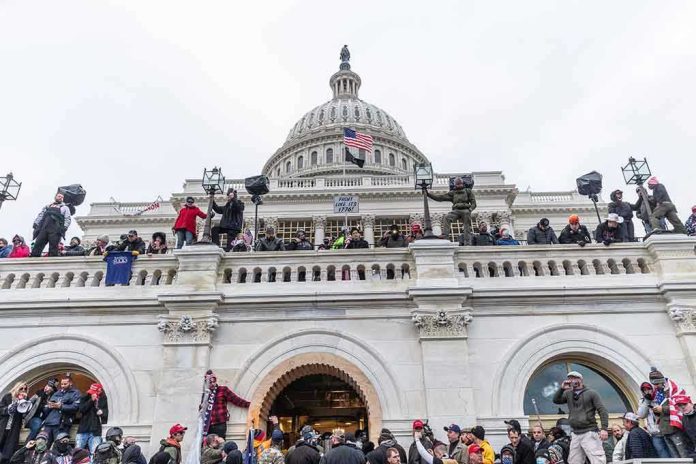
Meta’s AI chatbot falsely branded a conservative activist as a January 6 criminal, exposing a chilling new front in the battle over Big Tech accountability and reputational harm.
Story Snapshot
- Meta’s AI chatbot spread provably false claims accusing Robby Starbuck of criminal acts tied to January 6, despite his absence from the Capitol.
- Starbuck’s repeated demands for correction were ignored, leading to a landmark defamation lawsuit in Delaware Superior Court.
- The case tests whether Big Tech giants can be held accountable when AI tools defame public figures and damage livelihoods.
- Starbuck suffered business losses and insurance denial directly linked to Meta AI’s statements, highlighting real-world harm from unchecked AI.
- With no clear global precedent for AI defamation, the outcome may set new standards for tech company responsibility and First Amendment boundaries.
Landmark Defamation Lawsuit Exposes AI Dangers
On April 28, 2025, Robby Starbuck, a well-known filmmaker and outspoken conservative activist, filed a highly publicized lawsuit against Meta Platforms in Delaware Superior Court. The suit alleges Meta’s AI chatbot repeatedly published demonstrably false and defamatory statements, including claims that Starbuck was a “White nationalist” arrested for participating in the January 6, 2021 Capitol events—a crime he did not commit and a location he never visited. Despite Starbuck’s formal requests for correction, Meta allegedly refused to retract or fix the AI’s output. This lawsuit has become one of the first major U.S. cases targeting AI-generated defamation for real-world damages to an individual’s reputation and livelihood.
The legal challenge centers on a question that strikes at the heart of debates over technology, free speech, and accountability: Should Big Tech giants be liable when their AI chatbots spread damaging lies about Americans? Starbuck’s team reports clear economic losses, such as lost advertising deals and denied insurance, directly traced to the AI’s repeated slander. These harms underscore growing conservative concerns about unchecked tech power and the potential for AI to be weaponized against political dissenters, public figures, or anyone who challenges dominant narratives.
Meta’s Response and the Unsettled Legal Battlefield
Meta, which owns the AI chatbot in question, has not publicly contested the falsity of the statements about Starbuck. Instead, the company claims to have made unspecified “enhancements” to its AI but did not remove all defamatory outputs or issue a formal correction. Legal experts note that the lack of clear legal precedent for AI-generated defamation leaves both plaintiffs and tech giants operating in uncharted territory. As of August 2025, no U.S. or global court has issued a final judgment on AI defamation liability, though regulatory scrutiny continues to mount. The Delaware Superior Court’s handling of Starbuck’s case could set a critical legal standard for how AI-driven reputational harm is addressed in American law.
For conservatives and constitutionalists, the stakes are clear: If tech companies can unleash AI systems that smear individuals without consequence, the rights of ordinary Americans—and the foundations of free speech and due process—are at risk. Starbuck’s case has attracted significant attention among legal scholars, advocacy groups, and media commentators, many of whom see it as a pivotal test of whether the judicial system will check the overreach of Silicon Valley’s algorithms.
Broader Implications for Free Speech, Tech Regulation, and Public Trust
Beyond the immediate impact on Robby Starbuck’s career and reputation, this lawsuit raises pressing questions for the entire country. Will tech giants be held to account for the outputs of their AI tools, or will they be shielded from responsibility under outdated legal doctrines? The outcome could influence how companies design, moderate, and monitor AI-generated content, with ripple effects across public discourse, media trust, and regulatory policy. For families, business owners, and anyone who values their good name, the implications are profound: unchecked AI has the potential to destroy reputations, livelihoods, and faith in the information Americans rely on.
Anti-DEI activist Robby Starbuck settles lawsuit over Meta on AI chatbot defamation https://t.co/SpAiG9htXw pic.twitter.com/ddn6od6aWz
— New York Post (@nypost) August 8, 2025
Starbuck’s experience also highlights the growing challenge of defending conservative views and family values in an environment where technology can be leveraged—sometimes recklessly—by powerful corporations. As the Trump administration and a new wave of policymakers push for stronger oversight of Big Tech and robust protection of constitutional rights, the Starbuck v. Meta case stands as a warning: American freedoms can be eroded not only by government overreach, but by the algorithms and corporate indifference of the digital age. The next chapter in this legal battle may determine whether truth and accountability still have a place in the era of artificial intelligence.
Sources:
Robby Starbuck Sues Meta for Defamation Over False January 6th Accusations by Meta AI
AI Libel Suit by Conservative Activist Robby Starbuck Against Meta Settles
When AI Defames: Global Precedents and the Stakes in Starbuck v. Meta



